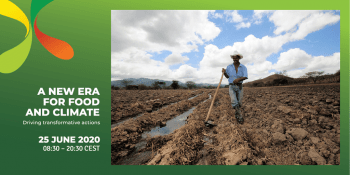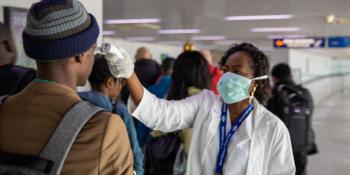Scaling up the use of climate information: How CCAFS inspired a rural development project in Burkina Faso

CCAFS project serves as an inspiration for promoting the use of climate information services in West Africa.
The Agropastoral Potential Valorization Program in the East (VALPAPE) aims to improve food security in the Eastern region of Burkina Faso by increasing and securing the income of agropastoral producers.
Recognizing that agricultural producers and pastoralists are vulnerable to the effects of climate change, the ACCORD Consortium, comprising ACADE Switzerland and CORADE (executing agency of the VALPAPE Program), decided to draw on the experience of CCAFS and develop a component dedicated to the use and dissemination of climate information. The objective was to maximize, with experienced beneficiaries, the use of weather and climate information.
The VALPAPE program, currently underway in the eastern region of Burkina Faso, has used the knowledge gained from the Climate Information Services in West Africa project initiated and implemented by CCAFS in West Africa from 2012 to 2015.
The pilot project aimed to make agriculture resilient to the impacts of a changing climate. Climate information, disseminated to farmers, helped them to better manage climate risks, take advantage of favorable weather conditions and protect their livelihoods.
In West Africa, the Climate Information Services in West Africa project, in collaboration with meteorological services, radio stations, and mobile phone companies, has proven both its significance and relevance in Burkina Faso, Senegal, Ghana, Niger and Mali.
In the Yatenga province (Northern Burkina Faso) La Voix du Paysan, a radio station based in the city of Ouahigouya served as a relay for the dissemination of climate information. In Ghana, the private phone company Esoko played this role while in Senegal, the Union of Associative and Community Radio (URAC) has continued, since then, to provide regular information to more than 7 million Senegalese farmers.
How did CCAFS "inspire" the VALPAPE project?
Responsible for evaluating the Climate Information Services in West Africa project, which had come to an end in the five CCAFS pilot countries in West Africa, CORADE was able to learn from the achievements of the project before understanding the importance of climate information for the beneficiaries of the VALPAPE Program.
CORADE then organized a study tour to the Climate-Smart Village (CSV) of Tibtenga in Burkina Faso. The mission was made up of a group of about 20 people from local communities, agricultural services, farmers' associations, the national extension service and agricultural research. The same mission also went to the Cinzana CSV in Mali. The participants of the tour had the opportunity to become familiar with the specificities of the pilot project directly with the beneficiaries and other stakeholders.
Based on this experience, the climate information component of the VALPAPE Program was developed according to the realities of the provinces of Tapoa, Gnagna and Gourma in the eastern region of Burkina Faso, the largest agro-sylvo-pastoral wildlife area in the country.
Watch the video of the VALPAPE Program inspired by CCAFS West Africa's Climate Information Services pilot project (in French):
Currently, the support system for the use of climate information set up in the framework of VALPAPE is a success and the Regional Directorate of Agriculture has advocated for its strengthening through the second National Rural Sector Program (PNSRII).
Climate information is used to increase and secure the livelihoods of agropastoral producers. Through the use of the information they are receiving, producers can direct their farming operations," according to Adama Yerbanga, an agricultural technician.
Farmers and breeders testify to their satisfaction and explained they received the information through the radio.
In the framework of VALPAPE, this information is provided through collaboration between the meteorological services, the agricultural supervision services the local radios. Daily and even weekly, weather forecasts are broadcast at specific times by local radio stations.
Small-scale agricultural producers and breeders in the region show a need and a real motivation for the sustainability of the project for better decision-making related to their livelihoods.
With its pilot projects, CCAFS has demonstrated the relevance of its actions in getting agriculture better adapted to climate change.The replication of the Climate Information Services project by the VALPAPE Program marks a step towards scaling up the use and dissemination of climate services to facilitate farm decision-making under difficult weather and climate conditions.
Dansira Dembélé is the Communication Officer at CCAFS West Africa.
Alexis Kaboré is the co-founder of CORADE.



